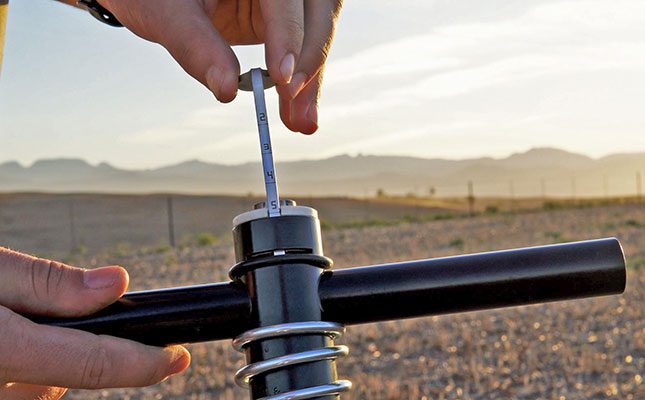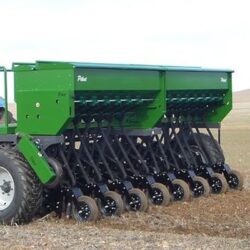A penetrometer is a diagnostic tool used to measure the degree and depth of subsurface compaction.
A probe inserted into the soil, it measures the amount of force required to make it penetrate to a specified depth. It is commonly used in geotechnical engineering, construction, agriculture, and other fields where knowledge of soil properties is critical.
The basic principle of a penetrometer is simple: the tip of the probe is pushed into the soil, the resistance is measured, and the results are recorded.
Patented design
The Piket penetrometer from Piket Implements stands out from its American counterparts for two key reasons: cost and design. So much so that the design has been patented.
To begin with, it’s a tough, no-frills field tool that is 100% mechanical; it requires no battery or other power source. This means it comes at a fraction of the price of more complex available alternatives. Its patented rubber depth gauge is simple yet effective, ensuring accurate measurements without the hassle.
This nifty little gadget provides critical information on the health of your soil. And for the price of a tank of diesel, it will take you a lot further.
Know your soil compaction
Research has shown that plants grow optimally in soils less dense than 200 psi. While they can grow in soils as dense as 300 psi, their root systems will be compromised, and yield will suffer greatly as a result.
Do you know the compaction of your soil? If you’re like most farmers, you’ll agree that this information would be advantageous, but expensive laboratory tests may seem to be the only means to find out.
At the same time, soils react differently depending on the season. Being waterlogged can add weight, droughts can play a major role, and overgrazing can have a huge impact. Mechanisation, too, can have an effect.
Regular testing will enable you to draw correlations between soil compaction and soil health, which is exactly why the Piket penetrometer can prove a game changer.
How soil is affected by farming methods is absolutely vital information if you want to cultivate healthy humus. Knowing the compaction of your soil in different seasons will ensure that unnecessary ripping and ground disturbance is avoided.
By continually monitoring the soil, you can figure out which farming methods work best and apply these accordingly.
Because the Piket penetrometer fits neatly behind the seat of your bakkie, you can have it on hand to carry out tests whenever you wish.
The Piket penetrometer is more than a tool to measure compaction; it’s a device to quantify what your farming methods are doing to your soil, information that is critical to the future of soil health and your sustainability.
The less tilling, the better
Farmers who reduce the amount of tilling by tilling only when necessary, and only to the required depth, save on time, fuel and labour.
What’s more, the less ground disturbance, the better the soil’s water-holding capacity, a crucial factor in dry areas where lack of water is a concern.
Less disturbance also means less soil erosion, and an increase in organic matter and biological activity, all of which contribute to higher profit over time.
It all starts with soil compaction tests, and the cheapest way to do that is with the Piket penetrometer.
By simulating nature as far as possible and by creating optimal growing conditions without overspending and overworking, you can reduce input costs and maximise profit.
What’s needed is a sound understanding of the impact of factors such as grazing, time and tilling, as well as how different crops and roots affect the soil.
Soil tells the story of our past farming methods, and it also holds the potential of improving profitability and sustainability. A compaction test is the key to achieving this, and the Piket penetrometer makes this easily possible.
Find out more about the Piket penetrometer at penetrometer.co.za.




